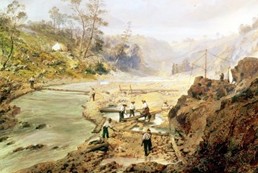TEXT:But still the people come.200 abandoned ships in San Francisco harbor , the crews deserting, rushing for the hills. He's traveled 6,000 miles. He's spent all his money. Now he travels by foot.Belgian Jean-Nicolas Perlot writes: We crossed 200 miles of wilderness full of Indians, bears, panthers, wildcats, snakes of every k ind. The first thing he finds isn't gold. It's graves. 200 of them. Prospectors cut off by rains in the foothills, starved to death. Approaching, we realized animals of some kind had dug up the bodies. I read a note attached to one of the graves. "God has willed that civilization should begin in this place, With this duty which a man owes to his kind. Bury the dead." Perlot does find gold, but never in the quantities that he'd dreamed. As the gold fields are picked clean, tensions rise, times get tougher. After just five years, the Gold Rush is over. I think that there is that Western mentality of prospecting --try and fail, try and fail, and the fact that you tried is worthy in and of itself. Of 300,000 who rush to find gold, less than one out of 100 struc k it rich. But fortunes were made by the merchants and landowners who supplied the miners. From dirt and dreams came the great cities of California. Both the West and the American character that built it are settled. Now this new powerhouse will face another revolution.
譯文:但淘金者仍紛至沓來。有200艘船只被遺棄在了舊金山港,棄船人員向山區(qū)匆匆進發(fā)。他一路航行了6000英里,花光了身上的所有錢財,現(xiàn)在徒步跋涉。比利時人讓·尼古拉斯·佩爾羅寫道:我們穿越了200英里的荒野,到處都有印第安人、熊、豹、野貓和各種蛇出沒。他首先找到的并非期待中的黃金,而是墳頭,足足有200座。淘金者們在山腳陷入大雨圍困,結果活活餓死。走近了,我們才發(fā)覺不知道是些什么動物把墳墓刨開了,我看到一座墳頭上留有張字條,上帝的旨意要讓此地成為文明的濫觴,創(chuàng)造文明是人對其同類的必履之責,請將死者安葬。佩爾羅找到了金子,但沒有他期望的那么多。當金礦幾近枯竭時,人際關系陡然惡化,生計變得更難維持,淘金熱僅僅持續(xù)了五年便偃旗息鼓。吉米·威爾士[維基百科創(chuàng)始人之一]:“我覺得淘金熱體現(xiàn)了一種西拓精神,屢試屢敗,屢敗屢試,嘗試本身就是價值所在。”在30萬之眾的淘金隊伍中,能發(fā)家致富的還不到百分之一,真正發(fā)財?shù)氖菫榈V工提供生活設施和補給的商人和地主。脫胎于泥土,起源于夢想,一座座偉大的城市在加州拔地而起,西部定居點確立的同時,成就這一切的美國精神也隨之確立。這個新興的強大國家將面臨另一場革命。













